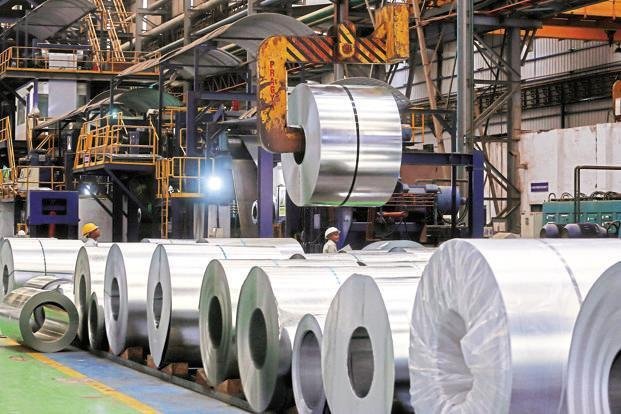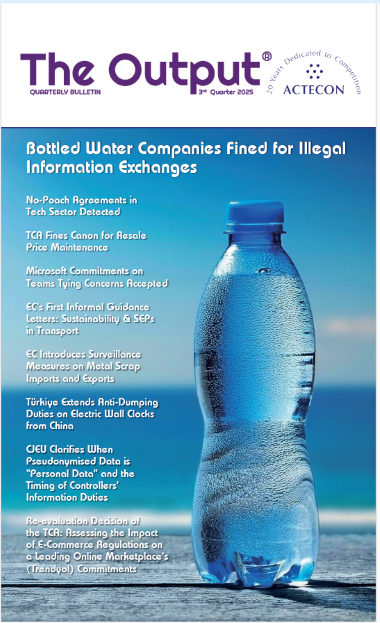EU's Provisional Safeguard Measures on Steel Products and a Practical Guide for Importers
| International Trade

EU's Provisional Safeguard Measures on Steel Products and a Practical Guide for Importers
Article by Ertuğrul Can Canbolat, Baran Can Yıldırım, and Özlem Başıböyük
Introduction
The countries in the world trading ecosystem have been taking steps to establish a freer trade since 1947- the time when the General Agreement on Tariff and Trade (GATT) was created. Especially after the establishment of the World Trade Organization in 1995 following the last round of the GATT (Uruguay Round of 1994), the restrictions and bans have rapidly been removed from the exchange of goods between the countries. It is without dispute that the world economy has extensively benefited from the trade liberalization.
The recent events, however, suggest that the nations started to stray away from the trade liberalization by implementing protectionist approaches such as imposing tariff obstacles, duties and quotas. It is further considered that the United States' recent restrictions triggered the concerned backwards trend (For more on the recent restrictions: Turkey Initiated A Safeguard Investigation To Steel Imports and Customs Updates In Turkey For The Import Of Various Goods).
As a result of this protectionist approaches, the European Commission announced that it had initiated a safeguard investigation on imports of twenty-six different steel product categories to prevent trade diversion into the EU by publishing a notice dated 06.03.2018 and numbered 2018/C 111/101. The scope of the investigation was extended to include two additional product categories on 28.06.2018.
The preliminary assessments carried out by the Commission revealed that there exists a threat of serious injury on the EU's steel producers and increase of imports as a result of unforeseen developments. Therefore, the Commission imposed a provisional safeguard duty of 25% on imports of 23 different product categories on 17.07.20182.
Although the Commission alleges it has found that all necessary requirements are present in the case at hand to impose a provisional safeguard measure, it is considered that the investigating authorities in trade defense investigations should thoroughly observe the interest of all parties who may be affected from the measures, especially the dynamics of the downstream markets (i.e. interest of the EU surrounding the free imports of the products concerned).
How are Turkey and other Developing Countries Affected?
It has been decided that a provisional safeguard duty of 25% on the import of twenty-three product categories to the European Union will be applied for a period of maximum 200 days starting from 19.07.2018 regardless of their origin except for developing countries.
The relevant safeguard measure is to be imposed once imports exceed a certain amount in quantity on the basis of each product category and will expire on 04.02.2019 at the latest. Therefore, no safeguard measures will be applied unless the relevant quota is exceeded. A list that includes the product categories, relevant HS Codes and quotas can be found here under Annex 5.
Furthermore, in accordance with the applicable rules, the Commission undertook a separate evaluation for the developing countries including Turkey. In this context, WTO member developing countries, whose shares in the European Union market are less than 3%, are excluded from the relevant safeguard measure, provided that the total market share of all WTO member developing countries is less than 9%. Moreover, exclusion from the relevant safeguard measure on a product basis has been granted for some developing countries with low levels of imports into the European Union. A list that shows the measures to be applied on each developing country can be found here under Annex 4.
Product categories on which the measure will be imposed on the import from Turkey, relevant HS Codes and the quotas mentioned above are presented in the table below:
|
Product Category |
HS Codes |
Quota |
Duty |
|
Non Alloy and Other Alloy Hot Rolled Sheets and Strips |
7208 10 00, 7208 25 00, 7208 26 00, 7208 27 00, 7208 36 00, 7208 37 00, 7208 38 00, 7208 39 00, 7208 40 00, 7208 52 99, 7208 53 90, 7208 54 00, 7211 14 00, 7211 19 00, 7212 60 00, 7225 19 10, 7225 30 10, 7225 30 30, 7225 30 90, 7225 40 15, 7225 40 90, 7226 19 10, 7226 91 20, 7226 91 91, 7226 91 99 |
4,269,009 |
25% |
|
Non Alloy and Other Alloy Cold Rolled Sheets |
7209 15 00, 7209 16 90, 7209 17 90, 7209 18 91, 7209 25 00, 7209 26 90, 7209 27 90, 7209 28 90, 7209 90 20 7209 90 80, 7211 23 20, 7211 23 30, 7211 23 80, 7211 29 00, 7211 90 20, 7211 90 80, 7225 50 20, 7225 50 80, 7226 20 00, 7226 92 00 |
1,318,865 |
25% |
|
Metallic Coated Sheets |
7210 20 00, 7210 30 00, 7210 41 00, 7210 49 00, 7210 61 00, 7210 69 00, 7210 90 80, 7212 20 00, 7212 30 00, 7212 50 20, 7212 50 30, 7212 50 40, 7212 50 61, 7212 50 69, 7212 50 90, 7225 91 00, 7225 92 00, 7226 99 10, 7226 99 30, 7226 99 70 |
2,115,054 |
25% |
|
Organic Coated Sheets |
7210 70 80, 7212 40 80 |
414,324 |
25% |
|
Stainless Cold Rolled Sheets and Strips |
7219 31 00, 7219 32 10, 7219 32 90, 7219 33 10, 7219 33 90, 7219 34 10, 7219 34 90, 7219 35 10, 7219 35 90, 7219 90 20, 7219 90 80, 7220 20 21, 7220 20 29, 7220 20 41, 7220 20 49, 7220 20 81, 7220 20 89, 7220 90 20, 7220 90 80 |
476,161 |
25% |
|
Non Alloy and Other Alloy Merchant Bars and Light Sections |
7214 30 00, 7214 91 10, 7214 91 90, 7214 99 31, 7214 99 39, 7214 99 50, 7214 99 71, 7214 99 79, 7214 99 95, 7215 90 00, 7216 10 00, 7216 21 00, 7216 22 00, 7216 40 10, 7216 40 90, 7216 50 10, 7216 50 91, 7216 50 99, 7216 99 00, 7228 10 20, 7228 20 10, 7228 20 91, 7228 30 20, 7228 30 41, 7228 30 49, 7228 30 61, 7228 30 69, 7228 30 70, 7228 30 89, 7228 60 20, 7228 60 80, 7229 70 10, 7228 70 90, 7228 80 00 |
728,270 |
25% |
|
Rebars |
7214 20 00, 7214 99 10 |
714,964 |
25% |
|
Gas Pipes |
7306 30 41, 7306 30 49, 7306 30 72, 7306 30 77 |
185,280 |
25% |
|
Hollow Sections |
7306 61 10, 7306 61 92, 7306 61 99 |
387,343 |
25% |
|
Large Welded Tubes |
7305 11 00, 7305 12 00, 7305 19 00, 7305 20 00, 7305 31 00, 7305 39 00, 7305 90 00 |
258,133 |
25% |
|
Other Welded Tubes |
7306 11 10, 7306 11 90, 7306 19 10, 7306 19 90, 7306 21 00, 7306 29 00, 7306 30 11, 7306 30 19, 7306 30 80, 7306 40 20, 7306 40 80, 7306 50 20, 7306 50 80, 7306 69 10, 7306 69 90, 7306 90 00 |
296,274 |
25% |
|
Non Alloy Wire |
7217 10 10, 7217 10 31, 7217 10 39, 7217 10 50, 7217 10 90, 7217 20 10, 7217 20 30, 7217 20 50, 7217 20 90, 7217 30 41, 7217 30 49, 7217 30 50, 7217 30 90, 7217 90 20, 7217 90 50, 7217 90 90 |
393,091 |
25% |
Finally, it should also be noted that imports from Norway, Liechtenstein and Iceland, which are members of the European Economic Area, will not be subject to the relevant safeguard measures.
Competition between the product categories.
The Commission undertook a comprehensive analysis for the competition among the product categories in order to decide whether the products of the EU producers are like or directly competitive with the ones being imported. It has been reached there is a strong competition between imported products and products produced by the EU producers under the same categories. This is because they are similar in terms of physical and chemical characteristics, price, quality and sales channel.
The Commission has also determined a significant relationship and strong competition among the products covered under different product categories. It has been evaluated that products under different categories can easily be transformed into a competitive product following simple processes.
Therefore, the Commission considered that the products, if not protected under the provisional safeguard measure, may be converted into a different product in the country of import and imported under different HS Code, which would result in circumventing the measures.
As a result, it has been evaluated that competitive pressures can easily be shifted from one product to another and accordingly, it has been decided to apply the provisional safeguard to all twenty-three product categories.
How will the duties be imposed on importers? A practical guide.
As explained above, the provisional safeguard measures to be imposed will be implemented following a certain import amount on the basis of product category is reached.
Relevant quotas, which are not country-specific, will be allocated in accordance with the chronological order of the date of acceptance of the customs declarations for entry to free circulation. Therefore, quotas will be allocated on a first come first served basis.
The relevant quotas may be tracked on the following website with the "order number" set out here under Annex 5:
http://ec.europa.eu/taxation_customs/dds2/taric/quota_consultation.jsp?Lang=en
Accordingly, concerned customs administrations will examine the exporters' customs and requests for customs quota pursuant to the legislation of the EU and if such request is found appropriate, the request containing the date of acceptance and the exact amount will be forwarded to the Commission without delay.
The Commission will conduct the allocation of quantities on basis of the date of acceptance of relevant customs declarations to extent permitted by remaining balance of the customs tariff quota. On the day of allocation, if the sum of the amounts for all customs tariff quotas accepted on the same day is higher than the remaining balance of the customs tariff quota, the Commission will allocate the quantities on a pro rata basis.
In practice, quotas are allocated at the end of each business day. Accordingly, the relevant customs authorities will forward to the Commission the customs declarations at the end of each business day and the Commission will carry out the necessary duties in accordance with the customs declarations and requests attached to it. However, a blocking period has been envisaged until 01.08.2018 and the Commission will not allocate the quota at the end of each day until that date. Customs declarations and requests received by the date of 01.08.2018 will be allocated collectively at the end of the blockage period.
Footnotes
1. http://trade.ec.europa.eu/doclib/docs/2018/march/tradoc_156657.init-safe.en.C111-2018.pdf







